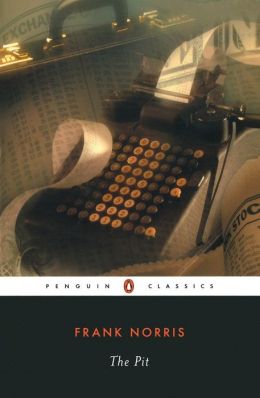 FRANK NORRIS'S "EPIC OF THE WHEAT" TRILOGY
FRANK NORRIS'S "EPIC OF THE WHEAT" TRILOGY The Octopus (Doubleday, Page; 1901)
The Pit (Doubleday, Page; 1903)
The Wolf (never completed)
Oh, Frank Norris. I spent YEARS with this writer, y'all, YEARS, I say, cause he wanted to be all up in my dissertation. Of course I wanted him in it, but after, like, 3 years of wrangling with his novels and stories and essays and all the other gazillion things this dude wrote, I was SO TIRED of Frank Norris. But now that several years have passed since the "diss" has been dismissed, I'm thinking fondly again of ol' Frank.
 If you haven't read any Frank Norris, I hereby order you to get one of his novels immediately: McTeague, The Octopus, anything! Dude could write. Seriously. And he wasn't just writing, ho-hum, in whatever style came to hand, but actively working out just what American literature should strive to be at the turn of the twentieth century. He argued passionately for a literature that plunged beneath the surface of everyday life and exposed its beating, bloody heart (he used that kind of language- don't blame me for making you queasy). Naturalism- this kind of raw, grandiose writing- would sweep away novels about comfy, cozy domestic incidents and force readers to see how people are manipulated and often crushed by the systems in which they live and work. Zola, Norris's hero, did the same for 19th-century France. Naturalists insisted on writing about prostitutes and soldiers, ragpickers and immigrants. And Norris was a master at this.
If you haven't read any Frank Norris, I hereby order you to get one of his novels immediately: McTeague, The Octopus, anything! Dude could write. Seriously. And he wasn't just writing, ho-hum, in whatever style came to hand, but actively working out just what American literature should strive to be at the turn of the twentieth century. He argued passionately for a literature that plunged beneath the surface of everyday life and exposed its beating, bloody heart (he used that kind of language- don't blame me for making you queasy). Naturalism- this kind of raw, grandiose writing- would sweep away novels about comfy, cozy domestic incidents and force readers to see how people are manipulated and often crushed by the systems in which they live and work. Zola, Norris's hero, did the same for 19th-century France. Naturalists insisted on writing about prostitutes and soldiers, ragpickers and immigrants. And Norris was a master at this. Sadly for us all, Frank died of a burst appendix in his early 30s. I know. Genius snuffed out by a damn appendix. Seriously. But before he died, he planned an epic trilogy, one that would follow a single theme from its beginning all the way through to its logical end, illuminating social, political, and economic forces along the way. He called it "The Epic of the Wheat," and was able to write two of the three projected novels. The Octopus explores (in great detail) the often violent conflict between California wheat growers and the railroad monopolies over prices and profits. The Pit picks up the wheat as it enters the world of financial speculation and is transformed from a tangible crop into a tool of economic domination and manipulation. The third novel, The Wolf, was to transform the wheat back into a tangible commodity, one that fed a starving European village.
Sadly for us all, Frank died of a burst appendix in his early 30s. I know. Genius snuffed out by a damn appendix. Seriously. But before he died, he planned an epic trilogy, one that would follow a single theme from its beginning all the way through to its logical end, illuminating social, political, and economic forces along the way. He called it "The Epic of the Wheat," and was able to write two of the three projected novels. The Octopus explores (in great detail) the often violent conflict between California wheat growers and the railroad monopolies over prices and profits. The Pit picks up the wheat as it enters the world of financial speculation and is transformed from a tangible crop into a tool of economic domination and manipulation. The third novel, The Wolf, was to transform the wheat back into a tangible commodity, one that fed a starving European village.Despite the sweeping nature of these novels, Norris was careful to create fully-realized, believable characters and vivid, detailed scenes. He wrote with a vivacity and energy that remind me of Nabokov. So read Frank Norris and enjoy. You're very welcome.
No comments:
Post a Comment